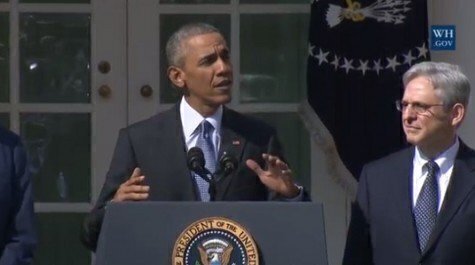On Wednesday, President Barack Obama said he would nominate Judge Merrick Garland to the Supreme Court, to fill the seat previously occupied by the late Associate Justice Antonin Scalia.
 Garland, 63, is the chief judge of the U.S. Court of Appeals for the District of Columbia.
Garland, 63, is the chief judge of the U.S. Court of Appeals for the District of Columbia.
Moments after an appearance by Obama, Garland and Vice President Joe Biden at the White House, the President officially notified the Senate of the nomination in a written statement as follows:
"NOMINATION SENT TO THE SENATE:
Merrick B. Garland, of Maryland, to be an Associate Justice of the Supreme Court of the United States, vice Antonin Scalia, deceased."
In February, President Obama made his intentions clear after Scalia’s unexpected death. “I plan to fulfill my constitutional responsibilities to nominate a successor in due time,” President Obama said in comments made to the nation on the night of Scalia’s passing.
Under the Constitution’s “Appointments Clause” in Article II, Section 2, Clause 2, the President “shall nominate, and by and with the Advice and Consent of the Senate, shall appoint ... Judges of the supreme Court.”
Senate Majority Leader Mitch McConnell previously has said the Senate Judiciary Committee, which is controlled by the Republicans, would not consider any Supreme Court nominee until after November’s general election. The Judiciary Committee’s GOP members, have agreed publicly to stick with McConnell’s plan.
But another problem relates to how a new Justice is nominated to the Court and approved in a contentious election year. The GOP currently has 54 votes in the 100-seat Senate, and any nomination this year would need Republicans voting for an eventual confirmation.
Under the constitutional Supreme Court nomination process, the President officially notifies the Senate of a nominee in a letter to the Senate. Under Senate standing rules going back to 1868, the nomination is sent to the Judiciary Committee, unless the nominee is a current or former Senate member.
Using the Senate’s parliamentary rules, the Senate Judiciary chair, Charles Grassley would have several ways to keep the nomination from moving out of committee. The Judiciary Committee can undertake a pre-hearing investigative stage, followed by public hearings and a decision on a recommendation for the full Senate. It is unclear if any of those actions would occur if the committee decides to defeat or table the nomination process before it gets to the Senate floor.
Other rumored candidates for the Court, as of last weekend, had been Sri Srinivasan, and Paul Watford. Srinivasan, 49, is a judge on the U.S. Court of Appeals for the District of Columbia and he previously served in the solicitor general's office in the George W. Bush and Obama administrations. Watford, 48, is a judge on 9th Circuit federal court.







